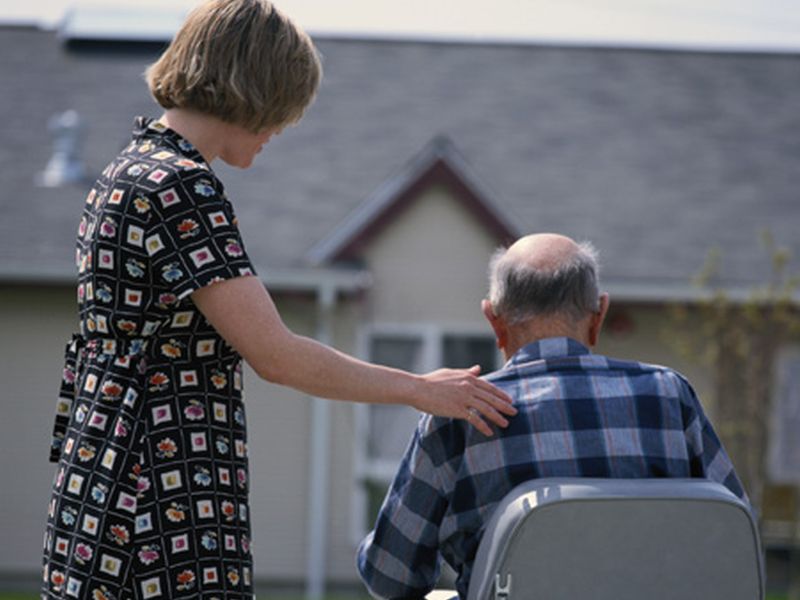
Monday, February 15, 2016

MONDAY, Feb. 15, 2016 (HealthDay News) -- Millions of family and friends who help older, disabled adults manage medications and navigate the health system may be sacrificing their own well-being, a new study suggests.
Caregivers who provided "substantial help" with health care in these settings were roughly twice as likely to experience physical, financial and emotional difficulties as those who did not provide that help, the study found.
Such caregivers, if they worked for a living, were three times more likely to be less productive on the job due to caregiving-related distractions and fatigue, according to the analysis.
The researchers believe it's the first nationally representative study of the effects of caregiving experienced by those who assist older adults with health care.
"Families are really invisible, even though they're commonly attending medical visits or they're involved when someone's in the hospital, managing the transition back home," said study author Jennifer Wolff. She is an associate professor of health policy and management at Johns Hopkins Bloomberg School of Public Health in Baltimore.
The study is published in the Feb. 15 online edition of JAMA Internal Medicine.
Caregivers see themselves as daughters, sons, spouses and friends -- not necessarily as "caregivers," Carol Levine, director of the New York City-based United Hospital Fund's Families and Health Care Project, explained in a commentary in the same issue. They may feel uncomfortable or too overwhelmed to take advantage of support groups and services, she said.
Yet, they are the ones asking questions about treatments, giving injections and managing medications -- a stressful role that can take a toll on their well-being, she said.
"By expecting family members to do all this stuff with relatively little support, we've created a multigenerational set of health problems, and so I think it's extremely concerning," Levine said.
Using data from two national surveys, Wolff and colleagues estimated that 14.7 million unpaid caregivers in the United States -- mostly family members -- assist 7.7 million older adults. Nearly half of the older adults have dementia, and more than a third have a severe disability, the study findings showed.
And 6.5 million of those caregivers provide substantial help with health care, meaning they assist with coordinating care and managing medications. Another 4.4 million provide some help, and 3.8 million provide no help with health care, the investigators found.
Caregivers who provide substantial help with health care are more likely to live with the older adult than those who provided some or no care, the researchers said. And they devote much more time to caregiving -- more than 28 hours a week -- than caregivers who don't help with health care (just over eight hours a week).
Almost half of caregivers who provided substantial help were assisting an older adult with dementia, the researchers reported.
Caregivers who provide substantial help are five times more likely to curb participation in things they enjoy -- such as visiting friends, attending religious services or participating in clubs or group activities -- than those who provide no help with health care, the study revealed.
Health care reforms aimed at rewarding teams of providers for the value of care they provide have largely ignored the role that family caregivers play, the study authors explained.
"It's a crisis of the system," Wolff said. "I think that families are often really disadvantaged because they don't have a recognized role in the health system."
Dr. Eric Coleman, a geriatrician at the University of Colorado Anschutz Medical Campus in Aurora, said caregivers don't want to be assessed by the health care system; "they want to feel more confident and prepared."
Coleman, winner of a 2012 MacArthur Foundation "genius" fellowship for his work on transitioning patients from hospital to home, has developed a website and tools to help caregivers manage a loved one's care at home.
Likewise, the United Hospital Fund's Next Step in Care website provides advice and tips for caregivers navigating the complex health care system.
Such tools, though, are only part of the solution, Levine said.
What's needed, she said, is more creative thinking about how to help caregivers unwind and de-stress. For example, Levine mentioned one program that brings together people with Alzheimer's and their caregivers to sing and perform in concert.
Respite care that provides caregivers a needed break from their responsibilities may be helpful, too, but tough to find in rural areas, she said.
"We need to give caregivers the freedom to say you matter as a person, and that doesn't just mean your physical health; that means your mental well-being, your quality of life," Levine said.
SOURCES: Jennifer Wolff, Ph.D., associate professor, health policy and management, Johns Hopkins Bloomberg School of Public Health, Baltimore; Carol Levine, director, Families and Health Care Project, United Hospital Fund, New York City; Eric Coleman, M.D., geriatrician and director, Care Transitions Program, University of Colorado Anschutz Medical Campus, Aurora; Feb. 15, 2016,JAMA Internal Medicine, online
HealthDay
Copyright (c) 2016 HealthDay. All rights reserved.
- More Health News on:
- Caregivers




























.jpg)












No hay comentarios:
Publicar un comentario